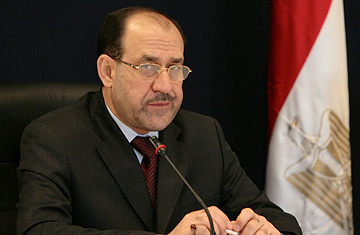
Iraqi Prime Minister Nouri al-Maliki
It's time for Nouri al-Maliki to go. In the 14 months he's been in charge, Iraq's Prime Minister has only ever had tenuous control over his country, but now even that has slipped out of his grasp. To paraphrase what everybody's history teacher used to say about Charlemagne and the Holy Roman Empire, Maliki's "national unity government" is not national, not united and now, not even really a government.
The resignations of Sunni and secular members of his cabinet only confirm what Iraqis have known for months, but the Bush Administration has steadfastly refused to acknowledge: that Maliki is himself a hindrance to national reconciliation. Even his severest critics in Washington seem to think Maliki is guilty only of incompetence — that he lacks the political skills to bring together Iraq's warring communities. But it's not that he can't reach out to the Sunnis: he just won't.
A Shi'ite partisan, he has surrounded himself with a group of like-minded advisers and pursued policies that, far from healing the country's sectarian wounds, have often aggravated them. While Maliki has himself been careful to act the conciliator, especially in conversations with President Bush and American politicians visiting Baghdad, his aides have repeatedly ridiculed and humiliated Sunni leaders, and ignored the advice of secular politicians.
Even members of other Shi'ite parties that form the dominant block in parliament routinely complain that they are shut out by the Prime Minister and his coterie. A faction of his own Dawa Party, led by his predecessor Ibrahim al-Jaafari, has begun quietly to seek a new Shi'ite-Kurdish alliance that would eject Maliki. And another former prime minister, Iyad Allawi, is trying to cobble together a secular-Sunni alliance that would put Allawi back in the top job.
Neither Jafaari nor Allawi inspires much confidence among Iraqis: both presided over governments that were corrupt and inept, and many of the problems that now beset Iraq can be traced to their missteps. But it is now clear that Maliki has been no improvement. Worse, his stubborn refusal to reach out to Sunnis is undermining the U.S. military's efforts to pacify Iraq and begin a drawdown of American troops. From Gen. Petraeus on down, commanders have repeatedly said the "surge" operation in and around Baghdad can work only if their military gains are accompanied by progress on the political front. Maliki has not kept up his end of the bargain.
This is not the first time Maliki's government has been on the verge of collapse; on previous occasions, he has been saved by the lack of unity among his rivals and, in no small small part, by expressions of confidence from the Bush Administration. This time around, the White House would be best advised not to throw him a lifeline. Allowing Maliki to drown may be the first step to rescuing Iraq.
